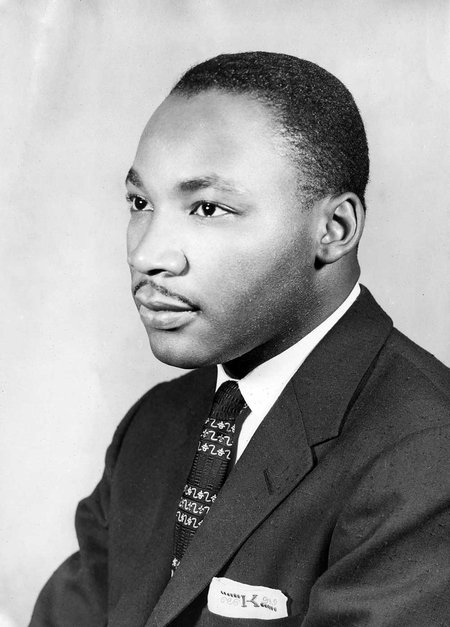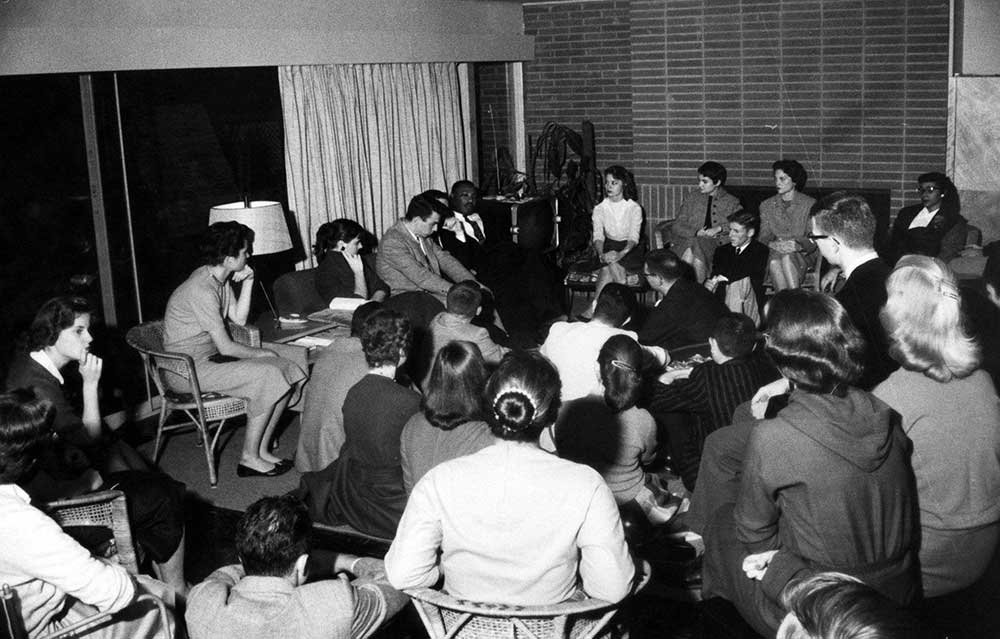Sixty years ago this month, the Rev. Martin Luther King Jr. visited Caltech as part of the Caltech Y's Leaders of America program, urging students to "rise above the narrow confines of individual concerns to the broad concerns of all humanity."
During his visit, February 25–27, 1958, King gave three talks to the Caltech and Pasadena communities. He also met with members of the Associated Students of Caltech (ASCIT) and Interhouse Committee (IHC); dined at Dabney, Blacker, Fleming, and Ricketts houses; and held daily office hours at the Caltech Y. King's keynote address, "Progress in Race Relations," drew an estimated 200 audience members to the Athenaeum.
By 1958, the then-29-year-old King had already risen to national prominence for his leadership of the Montgomery bus boycott and his philosophy of nonviolence.
In June, Caltech will host another leader of the civil rights movement—and a close associate of King's—Rep. John Lewis. The Georgia congressman, who was the youngest of the "Big Six" organizers behind the 1963 March on Washington, will be the Institute's 2018 commencement speaker, President Thomas F. Rosenbaum has announced.
Learn more about King's visit and view photos below.
King, pictured (center left) with a group of students in Winnett Lounge, gave three talks on campus: "A Great Time to Be Alive," "Facing the Challenges of a New Age," and the keynote, "Progress in Race Relations."
"We must have active commitment rather than mere academic acceptance if we are going to solve the racial problems that face America today," King told one audience at Dabney Hall.
In an interview with The California Tech, King said there were four things a Caltech student should do to address racism and segregation: "He should seek to give impetus to movements and to influence political leaders. He should seek to solve local problems. Injustice anywhere is a threat to justice everywhere. He should give support, both moral and financial, to freedom fighters everywhere. … And finally, he should help to educate himself and others."


Thomas Jovin (BS '60), then an undergrad, was selected to escort King and his wife, Coretta Scott King, around campus during their visit. A year later, Jovin, who had been elected ASCIT president, wrote to King asking for advice on recruiting black students to Caltech. In a May 1959 response, King wrote, in part: "So often Negro students are not in some of the major institutions of learning because no determined effort has been made to get them. And there is always the unconscious fear that they are not wanted. Once the ice is broken, however, it is not difficult to get students to continue to come."
The full letter is published in The Papers of Martin Luther King, Jr., Volume V: Threshold of a New Decade, January 1959–December 1960 (University of California Press at Berkeley and Los Angeles, 2005).
Today, says executive director Athena Castro, "The Caltech Y continues to honor Dr. King's memory and reflect on his legacy by providing opportunities for students to remain active and engaged citizens striving for a better world." In January, the Caltech Y, along with the Caltech Center for Diversity, the Black Students of the California Institute of Technology club, and the Black Ladies Association of Caltech, hosted a series of events, including a day of service, in celebration of King's work and the anniversary of his campus visit.
 Martin Luther King, Jr.
Credit: Caltech Archives
Martin Luther King, Jr.
Credit: Caltech Archives







